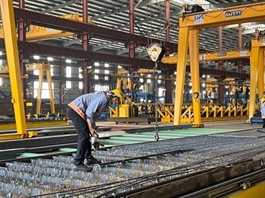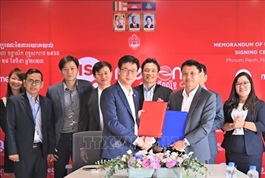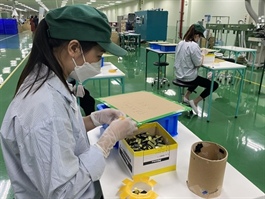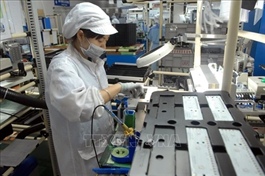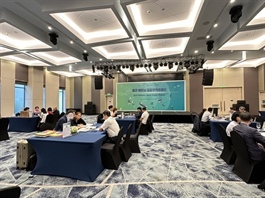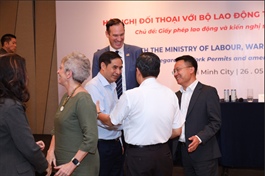HCM City seeks to attract remittances, investment
HCM City seeks to attract remittances, investment
HCM City will improve its business climate and create favourable conditions to attract remittances and investment, said a city official.
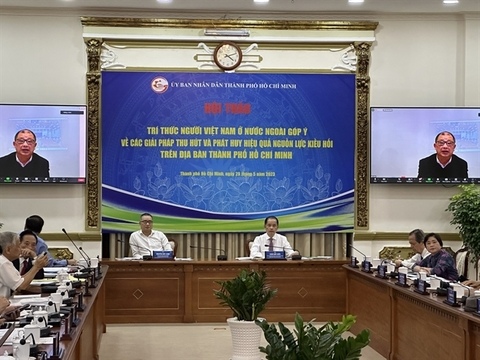
Speakers at a meeting in HCM City on Monday to discuss ways for the city to attract remittances and investment. — Photo danviet.vn |
Speaking at a meeting on Monday, Nguyen Duc Lenh, deputy director of the State Bank of Viet Nam (SBV) HCM City branch, said the city planned to enhance monetary and foreign exchange policies and remittance services.
Options for remittances include money transfers, cheques, bank transfers, prepaid cards and several other ways of sending money without a bank account.
"Besides foreign investment (FDI), remittances are a major source that helps ensure the foreign currency supply and stabilise the national foreign exchange reserves," he said.
Financial and banking expert Nguyen Tri Hieu said Viet Nam should ensure stable macroeconomic policies to increase the confidence of overseas Vietnamese to send back money for investment.
Incentives such as tax and fee exemptions for recipients are also needed, according to Hieu.
It’s also important to update information on city investment opportunities on the State Commission on Overseas Vietnamese website.
Peter Hong, vice chairman of Business Associations of Overseas Vietnamese, said the revised Land Law should be more favourable to overseas Vietnamese to invest in Vietnamese real estate.
He also proposed the city issue government bonds to overseas Vietnamese to invest in the city’s key projects.
According to Bui Viet Khoi, counsellor for Science and Technology at the Vietnamese Embassy in Australia, some 350,000 overseas Vietnamese live in Australia, most of them intellectuals who work at universities and big companies.
They send money back home to not only support their families but to invest in the country, including in real estate projects.
Nguyen Dinh Phu, chairman of the Vietnamese Business Association in the US, said the city should also promote its advantages in the fields of finance, banking, logistics, and tourism.
Nguyen Hoai Anh, deputy director of the Department of Economic Relations, Science and Technology under the State Commission for Overseas Vietnamese Affairs, said the city should develop a database on the overseas community to help attract more investment from them.
It needed to improve a variety of financial services to attract remittances while banks should enhance services to reduce costs associated with money transfers.
HCM City, the country’s largest recipient of remittances, received $56 billion of remittances in the 2012-2022 period, according to the SBV HCM City branch.
On average, it received $6-7 billion per year in the 2020-2022 period and is expected to receive $7.1 billion this year, up 2 per cent from 2022.
Remittances exceeded $2.1 billion in the first quarter, up 19.4 per cent year-on-year.
Remittances to the city were growing at 7-10 per cent annually until the past few years before the pandemic broke out.
Last year, remittances declined by 6.7 per cent to more than $6.6 billion due to the impact of the global economic slowdown, rising inflation in many countries, and the impact of geopolitical problems.
Remittances to Viet Nam reached $10 billion every year over the past decade.
Around 5.3 million Vietnamese live in 130 countries around the world, 83 per cent of them in developed countries, according to the State Commission for Overseas Vietnamese Affairs.
Viet Nam remains one of the 10 countries receiving the most remittances in the world, according to a recent report by the World Bank.
The country is among the Asia-Pacific region’s three biggest recipients with around $19 billion last year, up 5 per cent from 2021.
Among remittance sources, the US has the largest number of Vietnamese immigrants, followed by the UK, Australia, and Canada. Meanwhile, Japan, South Korea, and Taiwan (China) post the most number of workers from Viet Nam.




